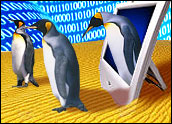How many out there use Linux? I bet if I asked 100 people, less than 10 percent would say yes. To be fair, people think in terms of computers, laptops, netbooks, and desktops, and that demographic is 90 percent Windows, 90 percent Microsoft-centric. But computers and OSes that power them permeate all aspects of our lives today.
While people mostly don’t care about computing they don’t directly choose and pay for, I think people might be surprised at the numbers and how much they do use Linux. Let’s let people know computing doesn’t always equate to Microsoft or Apple. Let’s spread the word that our world of technology is often “powered by Linux.”
Linux Everywhere
Do you Google? You use Linux! Do you shop at Amazon? You use Linux! Do you have a router for your home network? Do you have NAS (Network Attached Storage) on your home network for shared backups? Do you own a Logitech Squeezebox? Do you Tivo your shows? How about a smartphone (not iPhone)? Linux, Linux, Linux, Linux, and probably Linux.
Everyday Uses
Every time you use Google, you tap into an amazing network of modified Linux servers. Estimates range in the mid- to high hundreds of thousands of Linux servers at your service. Google created search as we know it (all due respect to Alta Vista et al. for their groundwork). Linux gave Google the technology to get it done.
Amazon, the world leader for online retail, bet its company on Linux around 2001. It would appear that Amazon’s success shows Linux to be a good bet.
Amazon also chose Linux for its Kindle OS. Interestingly, so did Barnes & Noble for its e-reader, the Nook.
Android smartphones run a Linux derivative. And 2010 was Linux’s watershed year on smartphones, when Android phones combined exceeded total iPhone units, becoming the number one smartphone OS.
Important Science and Research
NASA uses Linux. I remember viewing NASA news footage and feeling certain I saw computer monitors sporting what clearly was some form of an Xwindows session, and window trim told of Tom’s Window Manager (twm).
Fermilab depends on Linux enough to have its own Linux distribution, “Fermi Linux.” It also does intensive computing with the Linux Networx Cluster Supercomputer.
What’s cool about this is that Linux is a major component that keeps our world going. It’s durable and tough enough to hold up to real-world use. And all these devices and platforms running Linux sustain a subculture — almost a cult — of techies hungry for tech. At the surface, but hidden, Linux is everywhere. Underneath, but exposed, is a wealth of hosts and servers that techies routinely log in to for a Linux session fix.
My personal favorite is my Western Digital NAS. I ssh directly into the device. It’s a pared-down Linux installation but with enough functionality to let me play. I’ve modified some of the scripts, changed some of the startup functionality, and learned something about NAS architecture. I even installed Squeeze Server to provide streaming music to my Logitech Squeeze players (also powered by Linux, btw). Good stuff — a useful gadget that provides full backups of our network of home computers and a tiny little sandbox playground for me.
Linux in Popular Culture
I’ve only revealed the tip of the Linux iceberg, but if there is any doubt Linux is everywhere, consider its latest foray into TV game shows, no less. Watson, the supercomputer and contestant on a specially staged three-day “Jeopardy” event, handily defeated two of “Jeopardy’s” greatest champions. Yes, Watson is Linux.
Give Linux Its Due
We in the Linux community fret that Linux doesn’t get its due. We know Linux is recognized professionally. It would be nice if there were more recognition from the general public. People know GE makes light bulbs, Ford makes cars, and General Mills makes cereal. It would be nice if they knew more about who makes technology.
There is evidence that some people know. I once took my car in for new tires, and when paying the invoice, the cashier noticed my “LINUX” license plates and commented, “Oh yeah, that’s that new computer system… .” I was stunned, and to this day, I don’t know if she really knew or perhaps Googled it on one of their computers. Either way, she knew a little more about Linux.
Chin up — keep spreading the word. It’s our task to educate. Take opportunities to enlighten. Tell the world that computing doesn’t always mean Microsoft (or Apple, for that matter). Let others know we live in a technology world “powered by Linux.” It may not be interesting to many, but it’s important that they at least hear it mentioned. Powered by Linux. It’s a good thing.















































According to http://www.arm.com/products/processors/index.php there are about 20 billion ARM processors in existence and about 10 million shipped every day. These almost exclusively would run Linux and live in your set top boxes, washing machines, fridges and lots of other unimportant stuff like airbags and automotive braking systems. In other words there are already more processors out there running Linux than are running Windows.
As for security, openness is an advantage. The more people able to review your code the less likely you are to be shoddy and introduce defects and the more likely any defects are to be picked up and corrected. I have never personally experienced any malware on a Linux system and know no colleagues or friends who have over about the last 20 years – but I can’t even stretch the truth to say the same for the Windows systems I’ve been forced to use over the years, let alone all the people I know who have been affected by Malware using Windows systems. Some would obviously say that its because Linux isn’t used as much as Windows – but the truth is that its just a better design. I personally like this article on Linux security : http://www.theregister.co.uk/2004/10/22/security_report_windows_vs_linux/ (its a little dated but the concepts still hold).
Just as Google had to pull Applications because they contain Malware. Open source is its biggest security risk. Yes, Windows and Apple’s OS X are not immune but when you open everything up. Not just the good guys can see your cards. This is why I am surprised Google did not do more to protect its users. That is what bothers me the most. Linux in itself is not bad. Its how badly it is used that is the problem.
Good article. Not the usual Linux bla bla bla. Our family unit’s all run Ultimate-Edition Linux. Why? Reliable, power, security, software. And it has community. I can fix a problem 24/7 with world wide forums. It’s 2011, enough of the same old Linux bla, bla. Good job. Tell em more. We’re still here.